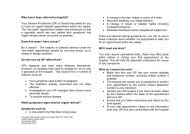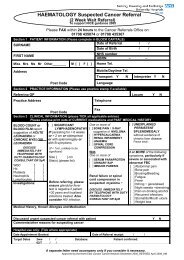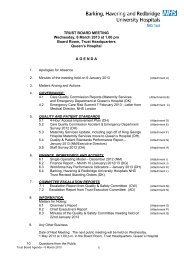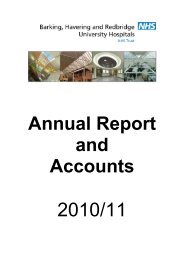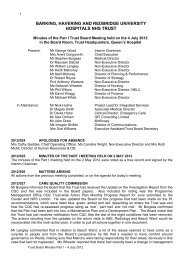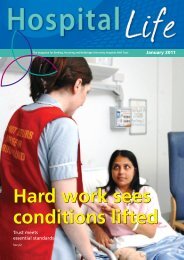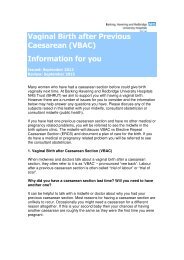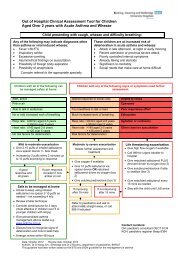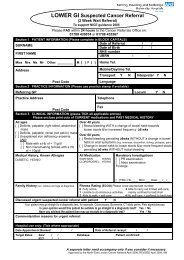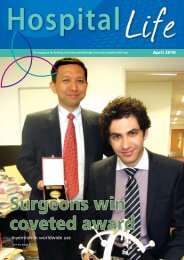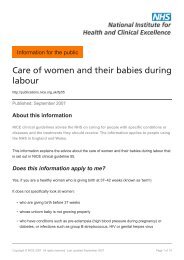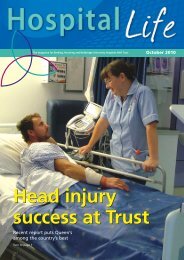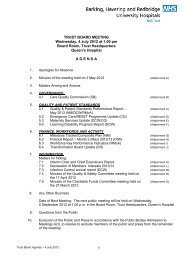Trust board meeting minutes May 12 - Barking Havering and ...
Trust board meeting minutes May 12 - Barking Havering and ...
Trust board meeting minutes May 12 - Barking Havering and ...
Create successful ePaper yourself
Turn your PDF publications into a flip-book with our unique Google optimized e-Paper software.
1BARKING, HAVERING AND REDBRIDGE UNIVERSITYHOSPITALS NHS TRUSTMinutes of the Part I <strong>Trust</strong> Board Meeting held on the 2 <strong>May</strong> 20<strong>12</strong>in the Board Room, <strong>Trust</strong> Headquarters, Queen’s HospitalPresent: Mr George Wood Interim ChairmanMrs Averil Dongworth Chief ExecutiveMr Stephen Burgess Medical DirectorDr Maureen Dalziel Non-Executive Director (Designate)Mrs Cathy Geddes Chief Operating OfficerMr William Langley Non-Executive DirectorMrs Ruth McAllDirector of Human Resources & ODMr Keith Mahoney Non-Executive DirectorMr Neill MoloneyDirector of Planning & PerformanceDr Robert RoyceDirector of StrategyProf Anthony Warrens Non-Executive DirectorMs Deborah Wheeler Director of NursingMr Phil WilsonNon-Executive Director, NELCMr David WraggDirector of FinanceMs Caroline Wright Non-Executive DirectorIn Attendance: Mr Nick Hulme Project Lead for Integrated ServicesMs Imogen Shillito Director of CommunicationsMrs Sue WilliamsExecutive Assistant/<strong>Trust</strong> Board SecretaryMr Wood opened the <strong>meeting</strong> by welcoming Dr Maureen Dalziel as Non-Executive Director (Designate) forthe <strong>Trust</strong>. Mr Wood also welcomed members of the Public, including two prospective c<strong>and</strong>idates forConsultant posts at the <strong>Trust</strong>.20<strong>12</strong>/001 APOLOGIES FOR ABSENCEMr Michael White, Non-Executive Director.20<strong>12</strong>/002 MINUTES OF THE PART I MEETING HELD ON 7 MARCH 20<strong>12</strong>The <strong>minutes</strong> of the Part I <strong>meeting</strong> held on the 7 March 20<strong>12</strong> were noted as a true record <strong>and</strong> signed by theInterim Chairman.20<strong>12</strong>/003 MATTERS ARISINGAll actions from the previous <strong>meeting</strong> completed, or on the agenda for today’s <strong>meeting</strong>.20<strong>12</strong>/004 CARE QUALITY COMMISSION ACTION PLAN UPDATEMr Burgess presented the Programme Management Office CQC <strong>Trust</strong>-wide Action Plan Progress Report<strong>and</strong> the updated CQC <strong>Trust</strong>-wide Action Plan for March. At present 39% of the 59 recommendations duefor completion by the end of March had been achieved <strong>and</strong> the majority of the others remained on courseto reach their conclusion within the next week or two. The PMO remained cautiously confident that the<strong>Trust</strong> would have 67 of its 81 recommendations green/blue by the end of April. This current position wouldbe presented to the Care Quality Commission <strong>and</strong> External Stakeholders at the Roundtable Event on the 8<strong>May</strong>. Mr Burgess confirmed that progress was good <strong>and</strong> he did not have to report any insurmountableblockages to the delivery of the Action Plan.The <strong>Trust</strong> Board noted the report.20<strong>12</strong>/005 BOARD ASSURANCE FRAMEWORK 2011/<strong>12</strong> – QUARTER 4Mr Burgess pointed out to the Board that the Board Assurance Framework (BAF) was in a transitionalstage <strong>and</strong> its current format was not the final version. The <strong>Trust</strong> was working to improve it <strong>and</strong> would beholding further <strong>meeting</strong>s in the next month to achieve this. Mr Burgess highlighted the detailed sections<strong>Trust</strong> Board Minutes Part I – 2 <strong>May</strong> 20<strong>12</strong>
3Mr Royce informed the Board that there was a specific workstream to look at King George Hospital withinthe context of the whole health economy <strong>and</strong> it was recognised that this was a key deliverable that had tobe met. The LTFM would include King George <strong>and</strong> how other communities fitted into it. Mr Royce wouldupdate the Board on progress at the July Board <strong>meeting</strong>, but he emphasised that it was important thatgiven the fact that the Commissioner’s <strong>and</strong> NHS London would no longer be around in March next year,that there was a completely solid plan in place by October this year at the latest.The <strong>Trust</strong> Board confirmed their support of the action plan <strong>and</strong> noted those areas which would be led bythe <strong>Trust</strong>.Action: Rob Royce 4.7.<strong>12</strong>20<strong>12</strong>/007 QUALITY & PATIENT STANDARDS PERFORMANCE REPORT – MARCH 20<strong>12</strong>Mr Moloney presented the Quality & Patient St<strong>and</strong>ards Performance Report for March 20<strong>12</strong>. Mr Langleyraised the issue of the team of Social Workers from <strong>Havering</strong> Social Services <strong>and</strong> a <strong>Trust</strong> DischargePlanning Nurse piloting six day working for six weeks <strong>and</strong> that although two weekends of the six hadshowed improved discharge performance, the others were disappointing. Mrs Geddes did not know thedetail around the pilot, but she commented that although additional resources could be put in, the <strong>Trust</strong> didnot have enough Consultant presence at the moment to facilitate an increase in discharges. This was partof the work she was taking forward with McKinsey. It could be something very simple like an administratorwho worked all week, but did not work at the weekend. It was therefore about finding out how the wholesystem worked <strong>and</strong> ensuring that everyone was clear <strong>and</strong> understood changes being made <strong>and</strong> how theyinter-related with other organisations.The Board agreed that it was good news that the <strong>Trust</strong> was delivering consistently on a whole range of keyperformance indicators, including the 18 week target, Cancer <strong>and</strong> Elective Admissions. An area ofconcern was the lack of confidence in the <strong>Trust</strong>, its Doctors <strong>and</strong> nurses <strong>and</strong> midwives. This wasdisappointing, due to the number of people that had been recruited recently. The fact that there was nosense as to what mitigating action the <strong>Trust</strong> was planning to take to address this was also of concern. MsWheeler confirmed that these were responses on the ‘real time’ surveys <strong>and</strong> there had been a report to theQuality & Safety Committee regarding this. She informed the Board that the h<strong>and</strong> held devices on thewards had now been installed at King George. The <strong>Trust</strong> had seen more information coming through overthe last couple of months from these sources <strong>and</strong> this would assist in providing more robust data. Thisdata could be drilled down to ward/unit level <strong>and</strong> the Director of Nursing’s Department was talking to thenew Clinical Directors to see how they could use this information with their teams.The <strong>Trust</strong> had recently received the Patient Survey <strong>and</strong> the Inpatient Survey, both of which were not good<strong>and</strong> the Chief Executive confirmed that she had spoken to the Senior Leaders in the <strong>Trust</strong> this week <strong>and</strong>given them the results. Mrs Dongworth confirmed that the <strong>Trust</strong> would be taking all the work on thisthrough the Transformation Board <strong>and</strong> tracking it to ensure improvement over time.The Chief Executive drew the Board’s attention to the <strong>Trust</strong>’s performance on MRSA. Ms Wheelerinformed the Board that the <strong>Trust</strong> had exceeded the trajectory for last year by two. The target for this yearhad been set at seven <strong>and</strong> the <strong>Trust</strong> had already reported one case during April. Ms Wheeler confirmedthat a root cause analysis on this case was being undertaken. The <strong>Trust</strong> had been under scrutiny, as thiswas the first reported case in London. The Chief Executive confirmed that the <strong>Trust</strong> was sighted that, eventhough the target was seven, it wanted to come in under this figure by the year end <strong>and</strong> Mrs Dongworthhad invited an External Assessor, who was a Microbiologist at another <strong>Trust</strong>, to look at the <strong>Trust</strong>’s InfectionControl processes <strong>and</strong> the incidents of Norovirus last year. The <strong>Trust</strong> had had ongoing ward closuresthrough April for Norovirus. The External Assessor would look to see if there was anything that the <strong>Trust</strong>should do to tighten up its policies.The <strong>Trust</strong> Board noted the content of the report <strong>and</strong> supported the actions to bring the performance back inline with trajectory/target.<strong>Trust</strong> Board Minutes Part I – 2 <strong>May</strong> 20<strong>12</strong>
420<strong>12</strong>/008 EMERGENCY CARE REPORT ON MARCH 20<strong>12</strong> PERFORMANCEThe Chief Executive advised the Board that along with the Chief Operating Officer, she had attended aTFA Escalation <strong>meeting</strong> at the Department of Health with David Flory on the 17 April <strong>and</strong> he had made itquite clear the Emergency Care Pathway/Access target was the Department’s biggest concern, along withthe <strong>Trust</strong>’s finances. With regard to the Emergency Care Target, it was made very clear that theDepartment was setting the <strong>Trust</strong> a realistic target of continuous improvement, rather than a percentage bya set deadline.The Chief Operating Officer presented an update on the work started through the RESET Programme(Jonathan Dimson <strong>and</strong> Nicola Yates from McKinsey were present for this agenda item). In terms ofperformance, the <strong>Trust</strong> achieved 81.15% for the week ending 22 April <strong>and</strong> improved to 86.47% for theweek ending 29 April (KGH achieved 95%) <strong>and</strong> was the best performance for the last five weeks. TheBoard was shown a video, taken by McKinsey, on the Emergency Care Pathway. This was a powerfulmessage in terms of how the <strong>Trust</strong>’s staff viewed the Pathway at the moment, as well as some commentsfrom patients on the care they had received. Mrs Geddes confirmed that next week the <strong>Trust</strong> would befocusing more on the workstream relating to pre 11.00 a.m. discharges, as these were currently indicatingvery low numbers during the week <strong>and</strong> non at the weekend. She also confirmed that there would be a lotof changes taking place around the pre 11.00 a.m. discharges <strong>and</strong> starting from next week the <strong>Trust</strong> wouldbe looking at ways of getting the weekend discharge process in train very quickly. This would involvereviewing Job Plans, in order to get Consultants to come in at the weekend. The Board agreed thatCaroline Moore, one of the Deputy Directors of Nursing, should be commended for all her hard work inrelation to the improvement in the bed management process. Ms Geddes confirmed that an additionalresource had been put into the RATing area to enhance that process.Multi-disciplinary ward rounds at 8.00 a.m. had commenced this week <strong>and</strong> in addition to everything elsegoing on, the <strong>Trust</strong> was reviewing the length of stay of all patients over 30 days. As these reduced, the<strong>Trust</strong> would start looking at reviewing those patients with lengths of stay of over 14 days.The Chief Operating Officer was pulling together a Business Case around the costs of the changes to theEmergency Care Pathway, as there would be a cost if the <strong>Trust</strong> was going to ask Consultants to come in atthe weekend. In addition to Consultants working at the weekend, the Medical Director raised the point thatsupport services needed to be in place at the weekend, in order for the hospital to work on a 7/7 basis.Mr Wood thanked McKinsey’s for their work to-date <strong>and</strong> commented that the <strong>Trust</strong> would want to seecontinual sustained improvement. The <strong>Trust</strong> was working towards sustainability, but was sitting on a highlyvolatile system at the moment, <strong>and</strong> was not under any illusion that everything was fixed, as it was not.Mr Burgess informed the Board that an Interview Panel had been set in June for Consultants <strong>and</strong> MiddleGrades for the A&E Department <strong>and</strong> indications were that the <strong>Trust</strong> had attracted a good field ofc<strong>and</strong>idates. The aim of the <strong>Trust</strong> was to fill substantive posts with good quality individuals who would servethe organisation well. The medical staff in A&E felt more confident that the <strong>Trust</strong> would be in a betterposition than before to appoint to some of these posts. Recognition to Derek Hicks, Clinical Director forEmergency Care, <strong>and</strong> his colleagues, was given by the Board that with everything going on they had givensome of their personal time to go out to headhunt people, so the <strong>Trust</strong> would be able to recruit. Last year,the <strong>Trust</strong> could not get anyone to even fill in an application for a post in A&E.The <strong>Trust</strong> Board noted the performance <strong>and</strong> noted the actions taken to improve performance.20<strong>12</strong>/009 MATERNITY SERVICE UPDATE – MARCH 20<strong>12</strong>Ms Wheeler distributed the Maternity Services Weekly Performance Report for the week commencing the16 April 20<strong>12</strong>, together with a revised copy of the Balanced Scorecard with performance up to the end ofMarch. Ms Wheeler confirmed that the <strong>Trust</strong> was <strong>meeting</strong> regularly with the Commissioner’s <strong>and</strong> they hadasked the <strong>Trust</strong> to reflect back on the performance reporting over the last six months <strong>and</strong> to put forward aproposal about a revised assurance process that would change the way discussions were framed with the<strong>Trust</strong> Board Minutes Part I – 2 <strong>May</strong> 20<strong>12</strong>
5Commissioner’s <strong>and</strong> would move on to a more sustainable process, rather than detailed aspects of theservice being continuously discussed at <strong>meeting</strong>s.Ms Wheeler informed the Board that elective c-sections had been repatriated to the <strong>Trust</strong> from theHomerton since the beginning of April <strong>and</strong> two elective lists per week were running at King GeorgeHospital. Initial indications from women were that they were reporting very good patient experiences. Inrelation to the ‘capping’ of deliveries, the <strong>Trust</strong> had a <strong>meeting</strong> with the Commissioner next week to reviewthis.Mr Wood referred to the recruitment of 18 midwives <strong>and</strong> the continued use of 42 bank <strong>and</strong> agency staff.Ms Wheeler confirmed that this was partly around e-rostering <strong>and</strong> the impact of annual leave that hadaccrued for midwives on maternity leave, as referred to earlier under the BAF agenda item. Other staff hadalso held back on taking annual leave whilst the service was in crisis <strong>and</strong> had waited for new people tocome into post. Sickness rates had also impacted on the usage of bank <strong>and</strong> agency staff.The <strong>Trust</strong> Board noted the content of the report.20<strong>12</strong>/010 REVIEW OF COMPLANTS MANAGEMENTMs Wheeler presented the report from NHS London received mid March, following the review of complaintsmanagement, structures <strong>and</strong> processes undertaken in January this year. The action plan attached to thereport was a draft discussed at the <strong>Trust</strong> Executive Committee last week <strong>and</strong> Ms Wheeler was veryconscious that the new Clinical Directors had not been involved in the initial process, as the Divisions hadbeen in place at the time. Therefore at the <strong>Trust</strong> Executive Committee <strong>meeting</strong> Ms Wheeler had asked forcomments back by the end of this week, following which the action plan would be formally signed-off <strong>and</strong>the Clinical Directors would take ownership going forward.Ms Wheeler reported that complaints were continuing to be received at the same level; over 100 inFebruary. The biggest volume coming in was around Emergency Care, particularly the EmergencyDepartment. Additional administration support had been put into the Emergency Care Directorate, but theissue now was freeing up clinician’s time to prepare meaningful responses. One of the Associate MedicalDirectors was providing support to the Clinical Director in this regard. Ms Wheeler also informed the Boardthat the Complaints Department was looking at other ways of helping, in order to ensure complaints wereresponded to properly <strong>and</strong> quickly. It was recognised that the whole complaints process had not beenworking well, but the interviews for the report had taken place at the end of December, beginning ofJanuary before more processes had been put in place. The quality assurance for the complaint lettersremained at Executive Director level, but all complaint responses were signed-off by the Clinical Directorsbefore being forwarded for final sign-off. Ms Wheeler confirmed that the Complaints Department hadreceived positive feedback from staff now that they were copied in to the complaint letters/responses.Mr Wood highlighted that some of the recommendations contained in the report had not been included inthe action plan. Ms Wheeler informed the Board that she was trying to establish the complaints team as aresource <strong>and</strong> response unit for the organisation, rather than the driver for what happened. This linked intothe Care Quality Commission work <strong>and</strong> the cultural change required for how people work. The currentsystem was not delivering what was required <strong>and</strong> there did not appear to be any actions included aboutwhat the <strong>Trust</strong> was going to do to address this.It was agreed that Ms Wheeler would report back at the July <strong>Trust</strong> Board <strong>meeting</strong> on where the <strong>Trust</strong> waswith all of the above work. The question of a dedicated <strong>meeting</strong> room for complaints was highlighted by MsWheeler, as most <strong>meeting</strong> rooms were within clinical areas <strong>and</strong> were not a good place to conductconfidential complaints <strong>meeting</strong>s. This issue would be addressed quickly.The <strong>Trust</strong> Board noted the attached draft action plan <strong>and</strong> the verbal update given to reflect the discussions<strong>and</strong> decisions from the <strong>Trust</strong> Executive Committee <strong>meeting</strong>.Action: Deborah Wheeler 4.7.<strong>12</strong><strong>Trust</strong> Board Minutes Part I – 2 <strong>May</strong> 20<strong>12</strong>
620<strong>12</strong>/011 ISSUES FOR ESCALATION FROM QUALITY & SAFETY COMMITTEEMr Burgess drew to the Board’s attention the Quality & Safety Committee’s recommendation that the Boardgive consideration for patient’s being invited to attend the Public <strong>Trust</strong> Board <strong>meeting</strong>s to present theirexperiences/stories. The Patient Stories paper had been prepared by Gary Etheridge, Deputy Director ofNursing. The Board discussed whether, with all the current workload, this was the right time to take thisforward, as it would create additional work at a time when people were already very busy <strong>and</strong> shouldperhaps be deferred for the time being.The Chief Operating Officer informed the Board that this was a practice that had been in place when shewas at Whipps Cross <strong>and</strong> it had been recognised as really powerful <strong>and</strong> should be a top priority for this<strong>Trust</strong>. Mrs Geddes felt it was really important for the <strong>Trust</strong> Board to agree to this recommendation fromthe Quality & Safety Committee. It was proposed that Caroline Wright <strong>and</strong> Anthony Warrens, as Co-Chairsof the Quality & Safety Committee, should test it out at their <strong>meeting</strong>, work the recommendation through<strong>and</strong> bring back a proposition to the Board.The <strong>Trust</strong> Board noted the paper presented to the Quality & Safety Committee, supported it in principle, butagreed to defer for 3-6 months to provide the opportunity for the Co-Chairs of the Quality & SafetyCommittee to review the recommendation <strong>and</strong> to put a proposition together for the Board.Action: Caroline Wright/Anthony Warrens 5.9.<strong>12</strong>20<strong>12</strong>/0<strong>12</strong> TRIPARTITE FORMAL AGREEMENT MILESTONE TRACKERMr Moloney presented the Tripartite Formal Agreement (TFA) Milestone Tracker, which was the formaldocument being used by NHS London <strong>and</strong> the Department of Health to assess the <strong>Trust</strong>’s performancetowards becoming a Foundation <strong>Trust</strong>. The TFA set out the timeframe <strong>and</strong> the indicators that the <strong>Trust</strong>needed to meet around actions from the previous financial year – delivery of CIP <strong>and</strong> control total,Financial Planning (20<strong>12</strong>/13 SLA <strong>and</strong> Productivity Programme), Care Quality Commission –implementation of recommendations, Service Performance <strong>and</strong> implementation of Health4NEL. Aspreviously mentioned, detailed discussions had been held with NHS London <strong>and</strong> the Department of Healthwhen the Chief Executive <strong>and</strong> Chief Operating Officer had met with David Flory recently to review the TFA.The Chief Executive informed the Board that Neill Moloney <strong>and</strong> Helen Brown, Director of Performance &Delivery at NHS North East London <strong>and</strong> the City (NELC), were looking at how they could take the format ofthe TFA to the next level <strong>and</strong> were also reviewing the milestones that needed to be achieved. This wouldresult in a new format for the TFA being used for the next <strong>Trust</strong> Board report.Mr Wood raised the issue of the <strong>Trust</strong> <strong>meeting</strong> the agreed Emergency Care trajectory <strong>and</strong> Mrs Geddesconfirmed that she had prepared a draft trajectory to get the <strong>Trust</strong> to 95% by the end of July, but this wouldbe firmed up once the letter awaited from David Flory, following the <strong>meeting</strong> on the 17 April, was received.Mrs Geddes would provide copies of the trajectory for all members of the Board at the July <strong>Trust</strong> Board<strong>meeting</strong>.The <strong>Trust</strong> Board noted the report.Action: Cathy Geddes 4.7.<strong>12</strong>20<strong>12</strong>/013 BUSINESS PLAN 20<strong>12</strong>/13Mr Moloney presented the Business Plan for 20<strong>12</strong>/13. This plan sat on top of the Directorate <strong>and</strong>Corporate Departments Business Plans <strong>and</strong> pulled together all planning assumptions <strong>and</strong> key priorities for20<strong>12</strong>/13. It also included a detailed analysis of the workforce plans <strong>and</strong> the underlying financialassumptions. Mr Moloney reported that there was still a gap on the QIPP (CIP Programme) <strong>and</strong> thiswould be the focus of the next few weeks. Following a question from Mr Langley regarding interdependencieswith other organisations within the local economy, Mr Moloney informed the Board that the<strong>Trust</strong> was not currently fully engaged <strong>and</strong> there was a lot more work to be done. Part of this work would<strong>Trust</strong> Board Minutes Part I – 2 <strong>May</strong> 20<strong>12</strong>
7include Integrated Services within the Health4NEL implementation, which Mr Nick Hulme was leading on.Services currently in place needed to change considerably <strong>and</strong> the <strong>Trust</strong> would expect to see this occurringduring 20<strong>12</strong>. Mr Moloney also informed the Board that the Commissioning Strategic Plans were beingreviewed, as these were ambitious in terms of their attempts to reduce non-elective admissions <strong>and</strong>outpatients. The <strong>Trust</strong> was due to receive these Plans shortly <strong>and</strong> would then have a better idea of thelevel of investment that would be put into the community. These Plans would also have a section on interdependencies.Mr Wood raised the point that he would like to see tracking of the WTE by Directorates, along with thepayroll budgets; the WTE figures were included in the Plan, but were at Divisional level, not Directoratelevel. To achieve the <strong>Trust</strong>’s QIPP, the organisation must see significant reductions in headcount. Most ofthis would come out by the elimination of bank <strong>and</strong> agency staff. Mr Wragg confirmed that the Plans, asthey stood, had WTE projected by month <strong>and</strong> had been built into the budgets by month, but the key bitmissing was the QIPP target of £23m. Mr Wragg was reporting that the <strong>Trust</strong> was up to £9.5m ‘green’rated schemes for the QIPP, a further £4m ‘amber’, but the substantial proportion of £10m not yet rag ratedwould be driven by workforce reductions, which was not currently built into the budgets. With the supportof the Commissioner’s, a team from Ernst & Young had been appointed to look at the robustness of theQIPP <strong>and</strong> to identify further schemes to close the gap. Ernst & Young had already started this work <strong>and</strong>would be in the <strong>Trust</strong> for another five weeks. Regular updates on progress would be reported through tothe <strong>Trust</strong> Executive Committee, the Transformation Board, <strong>and</strong> also through to the Finance & ProgrammeManagement Committee. Mr Wragg informed the Board that the process was behind where the <strong>Trust</strong>would want it to be, but the Executive Team was absolutely clear it had to deliver a 5.5% reduction onincome as its QIPP <strong>and</strong> the process was now in place to deliver this. This key piece of work beingundertaken by Ernst & Young regarding the QIPP gap would enable the Business Plan to be completed<strong>and</strong> ready for ratification by the <strong>Trust</strong> Board.Mr Wood registered his concerns around the fact that the <strong>Trust</strong> had recruited 250 new staff, but the bank<strong>and</strong> agency costs had not declined.Ms Wright questioned the fact that there did not appear to be anything in the Business Plan to address the<strong>Trust</strong>’s cultural problems. The <strong>Trust</strong> needed to set out the action that it would be taking to address this <strong>and</strong>the Chief Executive confirmed that it had been agreed that the Transformation Board would be looking atthe work programmes to fill this gap <strong>and</strong> would come back to the <strong>Trust</strong> Board on the timelines <strong>and</strong> whenthe <strong>Trust</strong> expected the Plan to be populated. This would also be incorporated into next year’s BusinessPlan as well.The <strong>Trust</strong> Board noted the current version of the Business Plan for 20<strong>12</strong>/13.20<strong>12</strong>/014 INCOME AND EXPENDITURE BUDGETS 20<strong>12</strong>/13Mr Wragg reported that the position showed an income <strong>and</strong> expenditure budget deficit of £39.7m,excluding the impact of impairments <strong>and</strong> IFRS. The report set out the bridge reconciliation from the2011/<strong>12</strong> outturn position, the proposed budget control totals at Directorate level, QIPP targets for 20<strong>12</strong>/13<strong>and</strong> the key assumptions <strong>and</strong> risks. Mr Wragg informed the Board that a good contract had been agreedwith the Commissioner’s <strong>and</strong> they were comfortable with the assumptions that had been built in to theposition <strong>and</strong> the way it had been spread across the Clinical Directorates. The <strong>Trust</strong> was expected todeliver the required QIPP cost reduction programme, as other <strong>Trust</strong>s were delivering around 5% to 7%within their plans. NHS London <strong>and</strong> the Commissioner’s were concerned at the level of the QIPP schemesthat were not rated ‘green’, although they recognised the plan was moving forward. The <strong>Trust</strong> had beenworking through this with the Commissioner’s, with the assistance of Ernst & Young, to deliver a morerobust QIPP position.Along with the work being carried forward, which had been referred to above, Mr Wragg <strong>and</strong> the ChiefOperating Officer had been interviewing external Consultants in order to appoint an Interim QIPPProgramme Director to support existing resources <strong>and</strong> to lead the QIPP Programme once Ernst & Younghad completed their current contract. This additional support would provide the <strong>Trust</strong> with its own team tocontinue the monitoring <strong>and</strong> management of the process. Ernst & Young expected to be able to validatetheir work in five weeks time <strong>and</strong> would be preparing an interim report for the Finance & Programme<strong>Trust</strong> Board Minutes Part I – 2 <strong>May</strong> 20<strong>12</strong>
8Management Committee later this month <strong>and</strong> the Transformation Board in June. Mr Wragg reported thatErnst & Young was also assisting with the other key element, which was the Long Term Financial Model(LTFM) <strong>and</strong> the three to five year QIPP plan.Mr Langley raised the issue of the current position of the Project Management Office (PMO) staff who werecurrently monitoring Emergency Care, Maternity <strong>and</strong> delivery of the CQC Action Plan. Mr Wragg informedthe Board that the <strong>Trust</strong> was currently using an Interim Management Advisory Service in the PMO <strong>and</strong> thedecision on the future of this area, following any recommendations from Ernst & Young that the <strong>Trust</strong> wouldwant to build on, would be made by the new Director of Transformation, Dorothy Hosein, as she would bethe Executive Director Lead for the PMO in the future.The <strong>Trust</strong> had already made two new appointments to the Service Transformation team; a Clinical Lead forQIPP Programme <strong>and</strong> a Head of Service Transformation; two excellent appointments.The <strong>Trust</strong> Board agreed the proposed budgets for 20<strong>12</strong>/13.20<strong>12</strong>/015 FINANCE REPORT – MONTH <strong>12</strong> (MARCH) 2011/<strong>12</strong>Mr Wragg confirmed that the <strong>Trust</strong> had delivered the year end control total of £49.9m before £1.1mimpairment reversals. Against plan the adverse variance was £10m, the key variances being income£20.4m favourable, pay £21m adverse <strong>and</strong> non-pay £9.7m adverse. Mr Wragg confirmed the substantialnon delivery of the Cost Improvement Programme (QIPP), which was the major cause of the extent towhich the <strong>Trust</strong> had slipped from the original control total of £40m (£13.9m reported as implemented, whichleft a £14.4m shortfall against the £28.3m target).Mr Wragg reported to the Board that the <strong>Trust</strong> had met its statutory targets <strong>and</strong> had a £1.3m underspendon capital allocation to carry forward to next year. There had been a significant injection of cash at the endof the financial year <strong>and</strong> the <strong>Trust</strong>’s debtors had dropped drastically.The <strong>Trust</strong> Board noted the report.20<strong>12</strong>/016 ACCOUNTABILITY FRAMEWORK FOR FINANCIAL PERFORMANCE AND COSTCONTROL (ESCALATION POLICY)Mr Wragg informed the Board that he had taken comments from colleagues <strong>and</strong> had put together aframework for the management of the Clinical Directorates, with a clear escalation process to be usedthrough the performance management structure. He confirmed that the framework had been designed toexert financial control, rather than correct poor individual performance <strong>and</strong> would be rolled out with effectfrom the M1 performance review <strong>meeting</strong>s. All concerned would be informed that there would be a changein policy in that people would now be held to account <strong>and</strong> this would be communicated to the organisation.Mr Wragg confirmed that <strong>meeting</strong>s would be held with anyone who needed to talk through the framework,in order to fully underst<strong>and</strong> it.The <strong>Trust</strong> Board noted the contents of the report <strong>and</strong> approved the framework.20<strong>12</strong>/017 WORKFORCE KEY PERFORMANCE INDICATORS – MARCH 20<strong>12</strong>Mrs McAll highlighted several areas from the report, including the recruitment of 209 new staff in post,although there still remained some areas, such as A&E, where recruitment remained a challenge. Asreported earlier in the <strong>meeting</strong>, the <strong>Trust</strong> had been very encouraged that it had some good Consultant <strong>and</strong>Middle Grade Doctor applicants coming through for interview. Reported sickness absence rates haddecreased for the month of March by 1.40% on the February position, falling from 5.81% to 4.41%. Asreported at the last <strong>Trust</strong> Board <strong>meeting</strong>, the HR Department was doing a lot of work around sicknessreviews <strong>and</strong> were targeting Occupational Health referrals. For the month of March the <strong>Trust</strong>’s annualisedturnover decreased to 10.9% from 11.0% in February, which was 1.1% below the average of other largeAcute <strong>Trust</strong>s of a similar size. Mrs McAll reported that over the last four weeks the <strong>Trust</strong> had seen asignificant decrease in the usage of temporary staff.<strong>Trust</strong> Board Minutes Part I – 2 <strong>May</strong> 20<strong>12</strong>
9The HR Department proposed to commence new starter <strong>and</strong> exit questionnaires, focusing on A&E <strong>and</strong>Midwifery where there were currently a higher than average turnover of staff (current turnover in A&Enursing 18.9% <strong>and</strong> in Midwifery 16.6%) <strong>and</strong> this information would be built into future reports.Mr Wood felt the sickness absence rate was disappointing <strong>and</strong> the lack of ‘Not known’ in terms of thereporting for sickness absence was unacceptable. The <strong>Trust</strong> would reinforce across the organisation thatLine Managers needed to be informed of the reason for sickness absence <strong>and</strong> this must be reported on thesystem. Mr Langley felt it would be useful to have a trend analysis on this so the Board could see theinroads being made <strong>and</strong> also the effectiveness of actions, rather than just seeing high numbers. The workbeing undertaken by the HR Department on training Line Managers would help. With the e-rosteringsystem the <strong>Trust</strong> recorded very accurately its sickness absence rates, perhaps more than other <strong>Trust</strong>s, <strong>and</strong>although the <strong>Trust</strong> was running at 4 - 5%, it wanted to get below 4%. As well as the initiatives being run bythe HR Department, the <strong>Trust</strong> needed to set stretch targets for each Directorate <strong>and</strong> foster team workingthrough the OD strategy. The <strong>Trust</strong> needed to get Operational Managers to underst<strong>and</strong> that theorganisation was struggling to achieve the £23m savings <strong>and</strong> they were losing an opportunity in this area tomake savings.Mrs McAll reported that this was the last report that would be based on the old Divisional structure <strong>and</strong> nextmonth’s would be set out in the new Directorate structure format.The <strong>Trust</strong> Board noted the report.20<strong>12</strong>/018 CARBON MANAGEMENT PLANMr Royce reported that the <strong>Trust</strong> had been working in collaboration with the Carbon <strong>Trust</strong>, an organisationcreated in 2001 by the UK Government to help organisations reduce their emissions. The reduction incarbon emissions had financial consequences for the <strong>Trust</strong>, as well as for the environment. The paperpresented to the Board set out the scale of the challenge <strong>and</strong> outlined the actions required. The Boardagreed that they were fully in agreement to drive this programme down through the organisation <strong>and</strong> wouldbe pro-active in pushing this agenda. Quite a few of the actions had a lengthy pay-back period <strong>and</strong> insome cases required significant capital investment. As the Chair of the Capital Planning Group, Mr Roycewould be looking to undertake some of these actions this year in the 20<strong>12</strong>/13 Capital Programme, in orderto move the Plan forward. There were Grants available, but a lot of the funding had to come from the<strong>Trust</strong>’s Capital Programme. Mr Royce reported that the <strong>Trust</strong> was expected to fund the Programmes toreduce its carbon emissions <strong>and</strong> if it did not, it would be taxed.Mr Mahoney stated that there were normally quite a few savings to be made from good housekeeping,which could be used to fund the capital required in the longer term. Mr Royce also pointed out that the<strong>Trust</strong> had two pieces of Estate which were in a different preparedness for the future, therefore theinvestment would be different for the two sites.The <strong>Trust</strong> Board noted the content of the paper, approved the Carbon Management Plan <strong>and</strong> endorsed theactions described in the Plan for implementation.20<strong>12</strong>/019 MATTERS FOR NOTING:INTERIM CHAIR AND CHIEF EXECUTIVE’S REPORTThe <strong>Trust</strong> Board noted the Interim Chair <strong>and</strong> Chief Executive’s Report.20<strong>12</strong>/020 MINUTES OF THE QUALITY & SAFETY COMMITTEE MEETING HELD ON THE14 FEBRUARY 20<strong>12</strong>The <strong>Trust</strong> Board noted the <strong>minutes</strong> of the Quality & Safety Committee <strong>meeting</strong> held on the 14 February20<strong>12</strong>.20<strong>12</strong>/021 MINUTES OF THE STRATEGIC PARTNERSHIP BOARD MEETING HELD ON THE22 NOVEMBER 20<strong>12</strong>The <strong>Trust</strong> Board noted the <strong>minutes</strong> of the Strategic Partnership Board <strong>meeting</strong> held on the 22 November20<strong>12</strong>.<strong>Trust</strong> Board Minutes Part I – 2 <strong>May</strong> 20<strong>12</strong>
1020<strong>12</strong>/022 MINUTES OF THE CHARITABLE FUNDS COMMITTEE MEETINGS HELD ON THE1 AND 28 FEBRUARY 20<strong>12</strong>The <strong>Trust</strong> Board noted the <strong>minutes</strong> of the Charitable Funds Committee <strong>meeting</strong>s held on the 1 <strong>and</strong> 28February 20<strong>12</strong>.20<strong>12</strong>/023 ANY OTHER BUSINESSNo further business.Meeting closed at 3.35 p.m.The next <strong>meeting</strong> of the <strong>Barking</strong>, <strong>Havering</strong> <strong>and</strong> Redbridge University Hospitals NHS <strong>Trust</strong> Board will takeplace on Wednesday, 4 July 20<strong>12</strong> in the Board Room, <strong>Trust</strong> Headquarters, Queen’s Hospital.<strong>Trust</strong> Board Minutes Part I – 2 <strong>May</strong> 20<strong>12</strong>
TRUST BOARD MEETING2 <strong>May</strong> 20<strong>12</strong>Board Room, <strong>Trust</strong> Headquarters, Queen’s HospitalPoints <strong>and</strong> Questions raised by members of the Publicat the above <strong>Trust</strong> Board <strong>meeting</strong>Question:Mr Skillman mentioned that during theLINk site visit to the Sunrise Wards theyhad observed water jugs being filled,rather than half filled. This made itdifficult for older people to lift the jugs.Response/Action:It was confirmed that the <strong>Trust</strong> hadworked with Sodexo on this <strong>and</strong> hadsourced some half size jugs.Mr Skillman also highlighted that thewater jugs were filled about three timesa day <strong>and</strong> pointed out that when therewas Norovirus on the wards, by takingall the jugs away to refill at the sametime, jugs could get mixed up <strong>and</strong> therewas a possibility of cross infection.Ms Wheeler confirmed that all waterjugs were washed before refilling, butshe would follow this point up with allthe Wards.Regarding the Maternity Report, MrSkillman had attended the ClusterBoard <strong>meeting</strong> when maternitynumbers were discussed (a reductionof 2k in 20<strong>12</strong>/13). What were the<strong>Trust</strong>’s figures?Why had there been a divert from KGHto Queen’s, as the number of midwiveshad increased <strong>and</strong> the <strong>Trust</strong> was ableto h<strong>and</strong>le the number of births safely?There was a lot of work to do this yearto plan appropriately when activitytransferred across the whole healtheconomy, including Newham <strong>and</strong>Whipps Cross <strong>and</strong> there was reducedactivity at KGH, but plans had not beenfinalised, so the <strong>Trust</strong> was unclear onthe effect.This was about flow <strong>and</strong> the ‘cap’ thatwas still in place. There were furtherdiscussions planned for next weekabout the removal of the ‘cap’.When the MLU is in place, whatescalation plans would be put in place?There would be two escalation plans inplace, one for the MLU <strong>and</strong> one for theLabour Ward, which would form part of<strong>Trust</strong> Board Meeting (Part I) 2 <strong>May</strong> 20<strong>12</strong>
Question:Response/Action:the overall escalation plan for theMaternity Unit.Are the C-sections taking place at KGHa permanent arrangement?Yes, until such time as they can berepatriated back to Queen’s. This wasall part of the <strong>Trust</strong>’s bigger plan tobring the KGH maternity unit over toQueen’s.<strong>Trust</strong> Board Meeting (Part I) 2 <strong>May</strong> 20<strong>12</strong>
TRUST BOARD MEETINGActions from Minutes of Part I <strong>meeting</strong> held on 2 <strong>May</strong> 20<strong>12</strong>in the Board Room, <strong>Trust</strong> Headquarters, Queen’s HospitalAgenda ItemActionDeadlineDateDateCompleted/Update/Agenda Item2011/108(PerformanceReport)20<strong>12</strong>/006(Health4NELUpdate)20<strong>12</strong>/011(Issues forEscalationfrom Quality &SafetyCommittee)20<strong>12</strong>/0<strong>12</strong>(TripartiteFormalAgreementMilestoneTracker)Update on non-elective length ofstay at next <strong>Trust</strong> Board <strong>meeting</strong>.Provide an update on Health4NELat July <strong>Trust</strong> Board <strong>meeting</strong>.Review Patient Stories paper atQuality & Safety Committee <strong>and</strong>prepare proposition for <strong>Trust</strong>Board members to review atSeptember <strong>Trust</strong> Board <strong>meeting</strong>.Provide copies of the EmergencyCare trajectory at the July <strong>Trust</strong>Board <strong>meeting</strong>.NM 4.7.<strong>12</strong> 4.7.<strong>12</strong>(included in Quality &Patient St<strong>and</strong>ardsPerformance Report)RR 4.7.<strong>12</strong> Deferred toSeptemberCW/AW 5.9.<strong>12</strong>CG 4.7.<strong>12</strong> 4.7.<strong>12</strong>Interim Chair …………………Date …………………..<strong>Trust</strong> Board Meeting (Part I) 2 <strong>May</strong> 20<strong>12</strong>



![[4] Biopsy Leaflet.pub - Barking, Havering and Redbridge University ...](https://img.yumpu.com/51285530/1/190x134/4-biopsy-leafletpub-barking-havering-and-redbridge-university-.jpg?quality=85)
